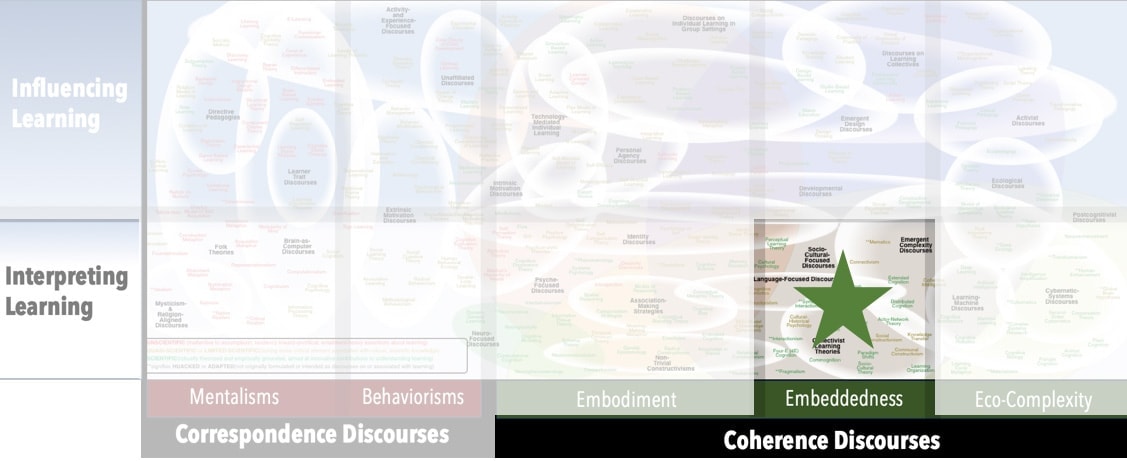Focus
Individuals engaging in situationally appropriate actionPrincipal Metaphors
- Knowledge is … scope of possible action and interpretation
- Knowing is … doing, bound to social and cultural contexts
- Learner is … a participant (individual) and a situation
- Learning is … increasingly effective performance in given situations
- Teaching is … managing affordances
Originated
1980sSynopsis
Framing learning and knowledge in terms of in-the-moment acting (rather than accumulation of information), Situated Cognition posits that thought cannot be separated from context – which includes others, language, activity, and so on. Learning is thus defined in terms of effective and fitting action within situation-specific demands of life. That is, learning is not about the individual acquiring knowledge, but about the co-determination of agent and context. Congruent constructs include:- Ortgeist – German for “spirit of place,” the influence of a setting – that is. of the physical and/or cultural environment – on knowing, doing, and being in that setting
Commentary
Situated Cognition shares many principles with Situated Learning, which focuses more narrowly on adult careers and which is much more modest in linking personal knowledge to context. In expanding the scope of the theory to any and all situations, Situated Cognition has been accused of under-estimating the power of propositional learning (which enables humans to develop knowledge in situations very dissimilar to where that knowledge is to be enacted) and to over-estimate the role of specific contexts (since humans can and do apply, extend, and otherwise extrapolate learnings to novel situations). Note, the criticism here is not that the emphasis on the role of the situation is incorrect; it is that the association to knowing may be over-estimated.Authors and/or Prominent Influences
John Seely Brown; Etienne WengerStatus as a Theory of Learning
Situated Cognition might be described as a Socio-Cultural Theory that places particular emphasis on the relationship to immediate context, but that offers little new insight into the complex dynamics of knowing and learning at either individual or collective levels.Status as a Theory of Teaching
While not a theory of teaching, many of the constructs associated with Situated Cognition serve as useful conceptual tools to inform formal education. These include ideas shared with Situated Learning, especially legitimate peripheral participation. Situated Cognition also places particular emphasis on affordances (i.e., properties of the context that are perceptible to the learner and which channel possibilities for effective action) and detection of invariants (i.e., becoming aware of what doesn’t change across situations to support learning transfer).Status as a Scientific Theory
With regard to its conceptual contribution, Situated Cognition is a scientific theory. In particular, it is associated with a broad and deep evidence base.Subdiscourses:
- Ortgeist - Ortgeist – German for “spirit of place,” the inspiration and impact of a setting – that is. of the physical and/or cultural environment – on knowing, doing, and being in that setting
Map Location

Please cite this article as:
Davis, B., & Francis, K. (2022). “Situated Cognition” in Discourses on Learning in Education. https://learningdiscourses.com.
⇦ Back to Map
⇦ Back to List
